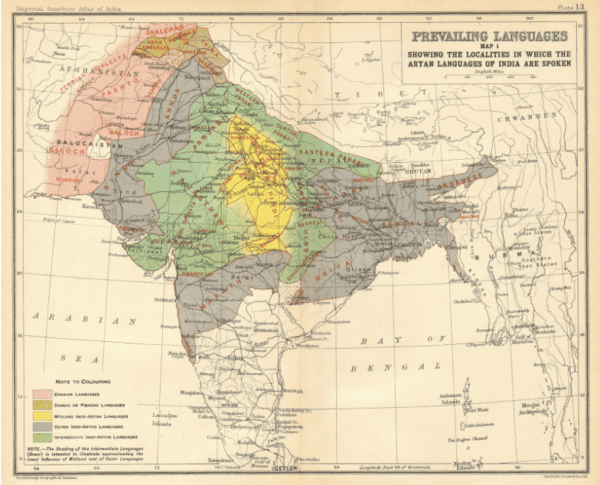What unites us as human beings despite our diverse cultures and beliefs?
In its various forms, language is a universal thread that runs through all societies, transcending cultural boundaries. It shapes our ways of thinking, how we interact with each other, our behaviours, and our collective consciousness. Understanding this universal influence of language is critical to analyze the complexities of human behaviour and culture. Language is the most powerful tool humanity has ever developed; it allows individuals to give meaning to feelings and emotions, convey knowledge, communicate, and share thoughts and opinions. This complex tool has permitted humanity to give meaning to their lives and to what’s around individuals regardless of their cultural setting or beliefs; language is the glue that keeps together millions of fragments that form the complex mosaic of human interaction. Nevertheless, we are limited to what we can verbalise through language; we cannot give meaning to something without the use of language. Thus, our perception of the world is intricately tied to this tool of communication that humanity has devised.
“The limits of my language mean the limits of my world.” – Wittgenstein
This statement by the Austrian philosopher Wittgenstein encapsulates the notion that human understanding of the world is limited by language. When we lack the verbal language to describe something, we lack the capacity to give it meaning. The interesting thing is that language is not universal. In contrast, many languages stem from different roots; language varies across world regions, being one of the reasons why the understanding of things might be slightly different from one place to another. For example, there are things that can be described through a word in one language, nevertheless other languages could lack vocabulary to describe it through a word. Language goes beyond words; it’s not always verbalized, and it can be manifested in various forms. An illustration is the case of a newborn and a mother where feelings and attachment are conveyed without verbal language; here, language is manifested by smell, touch, emotions, and feelings long before the baby can express a word.
So, does language hinder mutual understanding among individuals in different regions of the world? If we consider the theory developed by Wittgenstein, we might conclude that it does limit our understanding of the world. But how? Suppose language does define an individual’s knowledge and perception of the world. Can we validate the assumption that language also influences the structural outcomes of world systems, such as economic, political, social, and cultural structures?
Language defining perceptions
Language is not merely a tool for communication; it’s a lens that shapes our worldview. It molds the way we convey knowledge and our understanding. We cannot assume that the world’s understanding functions in one standard applicable to all human beings. On the contrary, language trains individuals to perceive the world in specific ways, influencing how we think and interact with each other. Consider the example of color; in English, there is only one word to categorise the color blue, while in Russian, the word “glouboy” refers to light shades of blue and “siny” to the darker shades (Boroditsky, 2010). This creates a different categorical understanding between both languages, impacting the perception of individuals. This is just one example, but it’s constantly present when comparing different languages.

Gender could be another example of how we understand things through language; in German, the sun is feminine, and the moon is masculine, while in Spanish, they are the opposite. In this case, the definition we give to both based on gender will define the attributes individuals will use to describe the characteristics of both the sun and the moon; Spanish speakers will likely use feminine attributes to represent the moon, and German speakers’ male attributes. This example shows how language influences individuals in determining stereotypical characteristics depending on gender. Moreover, English speakers typically identify the doer of an action, whereas Spanish speakers may argue that the action happened by itself. For instance, In English, you would say, “The man broke his hand”; in Spanish, you would say, “his hand broke itself”. Linguistic structural difference affects how both English and Spanish speakers think about a specific situation, perceive the intention of an action, and ultimately judge the cause of the action. Suggesting that language structures influence our reasoning process and perception, playing a crucial role in how individuals interact with each other.

The Australian tribe Kuuk Thaayorre is a clear example of how linguistic structures influence individuals’ perceptions of not only ways of thinking and human behaviour but also perceptions of time and geographical orientation. In the Western world, language allows us to describe where objects are situated; English speakers comprehend the location of objects in an egoistic, self-centered way, where objects are located based on the assumption that location revolves around the direction we are located. Nonetheless, for the Kuuk Thaayorre location is constructed without taking our position or direction as a point of reference but rather the actual geographical position of the object. For example, instead of saying the water bottle is located on the right side of the table, they would have an accurate understanding of where the object is located based on the cardinal system, “facing southwest”. Their structural way of constructing sentences gives them a precise understanding of geographical positions, making them more capable of determining the directions we are facing, whereas, in Western languages, we wouldn’t be able to close our eyes and determine the direction we are facing (Boroditsky, 2010). For them, time is also locked based on the landscape. In Western culture, time passes by from left to right based on the direction the individual is facing, whereas for the Kuuk Thaayorre, time is locked on the landscape, therefore “when they are facing north, they organize time from right to left. When they sit facing east, time comes towards the body. What’s the pattern? Time for them is not locked around their body but around the landscape” (Boroditsky, 2010).
Professor Boroditsky’s previous examples, presented in a 2010 TED talk, help us understand how language influences how humans perceive events, situations, objects, time, and even geographical positions, shaping our reasoning and understanding; however, could language influence the world of politics? It may not directly affect societies’ political preferences, but it could be a factor since public opinion is developed and conveyed through language.
Language & Thought: Linguistic Relativity
The Spahir-Wolf Theory, also known as the theory of linguistic relativity, refers to the proposal that language is highly influential in how people perceive reality, analysing how linguistic patterns affect the thoughts of individuals. The argument developed by E. Saphir implies that speakers of different languages may perceive reality differently, where language is one of the key factors that influence individuals’ reasoning and cognitive processes. If this is the case, to what extent does language influence individuals? The validity of this hypothesis persists in the realm of speculation since there is not enough empirical data to prove the extent to which language influences human behaviour and perception of reality. On the other hand, the linguistic theory of determinism developed by Wolf suggests that language and its structures determine human knowledge, thought, and other cognitive processes such as categorisation, reasoning, and perceiving behaviours; it suggests that the individual’s reasoning is constrained and limited by language. Therefore, individuals are stuck with the perspectives and cognitive processes that language enforces. Based on the latter, this theory entails more empirical evidence than linguistic relativity, as in this case, language might influence individuals’ thinking but not only merely their perception of reality; this hypothesis is primarily based on language structure influencing the perception of individuals of gender, time, direction, characterisation, and logic.
Voicing Politics

If we compare linguistics with other systems worldwide, there are apparent differences between varying systems. In the realm of politics, different world regions entail different political fictions and perspectives, which are mainly constructed by the cultural identity of individuals; if language influences the cultural identity of various groups of people, does it have repercussions on society’s political identity and preferences? The answer is yes. Language serves as a way of conveying thoughts and opinions, and it is strategically used to sway public opinion, thus shaping political appeals and structures. Language also plays a crucial role in how individuals understand legal frameworks and concepts of political structures; thus, constitutions and legislations are constructed in different linguistic structures depending on the language spoken. This is also a challenge in countries where there is a wide spectrum of languages spoken, as legislation has to be harmonised with the linguistic structures of the different groups of people within a country. Imagine India, a country ranking second in the world with the most languages spoken, with a total of 780 different languages. The country’s legal framework’s official languages are Hindi and English, nevertheless, there are many other languages spoken in the region and not everyone speaks the two official languages, this limits the understanding of individuals to the language they speak acting as a barrier to interpretation. The harmonization of a legal framework to another local language would imply slight changes in meaning and understanding.
Last Thoughts: A Discourse on Culture
If linguistic determinism holds true, can we conclude that language impacts people’s thinking, culture, political outcomes, and public opinion?
Language is one of the main factors influencing culture, and shaping the collective consciousness of individuals. In the realm of politics and public opinion, language serves to express public discourse, shaping individuals’ thought patterns, cultural preferences, and political systems. Ultimately, people use language to share knowledge, exchange opinions, debate, and deliberate, thereby demonstrating its powerful influence on culture and politics. Linguistic structure and other linguistic features shape individuals’ reasoning processes, affecting how information is communicated via language. Language reveals the power of the human mind, where cognitive processes vary across cultures. We have been able to create multiple systems of communication that shape our understanding of how the world functions, which is why assuming that our way of understanding is based on a universal standard is egocentric; our thoughts are narrow and limited by our linguistic capacity.






